A decade-long transformation of remote ethnic village
* In 2013, the idea of targeted poverty alleviation was first introduced in Shibadong Village. This pioneering notion focused on tailoring poverty alleviation efforts to different individuals, local conditions and causes of poverty.
* Over the years, Shibadong Village has developed several industries that draw on its strengths. In 2013, the per-capita net annual income in the village was 1,668 yuan, only 18.8 percent of the average income in other rural areas. In 2021, the figure surged to more than 20,000 yuan.
* With the victory in poverty alleviation, China is forging ahead with rural vitalization in an all-round way. More young people are contributing to the cause.
By Xinhua writers Tan Jian, Liu Fangzhou, Peng Peigen
CHANGSHA, July 22 (Xinhua) — Life has dealt Long Xianlan, 35, a bad hand: His mother left home for ever due to despair of life, his father died 20 years ago from illness, and his only sister drowned two years later.
The village in which he lives, Shibadong in central China’s Hunan Province, has a history of poverty. In 2013, 130 households, or 60 percent of the village population, lived below the poverty line. Long was one of them, living alone, with little hope.
Back then, he would never have imagined that, in less than a decade, his village would become a success in eradicating poverty, nor that he would regain control of his life, becoming a local cooperative manager.
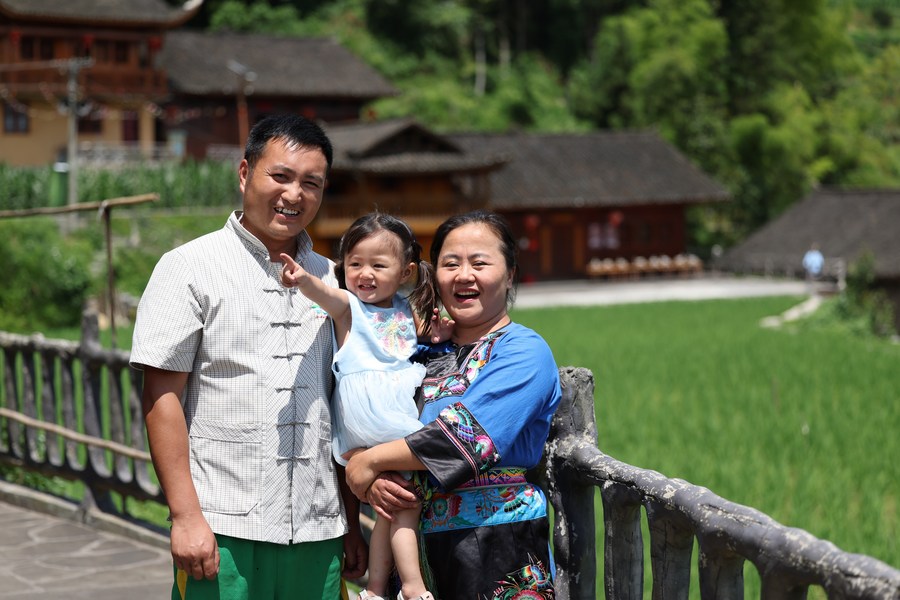
Long Xianlan (L), a beekeeper and head of a local cooperative, poses for a group photo with his family members in Shibadong Village in Xiangxi Tujia and Miao Autonomous Prefecture, central China’s Hunan Province, July 2, 2022. (Xinhua/Xue Yuge)
In 2013, the idea of targeted poverty alleviation was first introduced in Shibadong Village. This pioneering notion focused on tailoring poverty alleviation efforts to different individuals, local conditions and causes of poverty.
In February 2021, China announced the country had eliminated absolute poverty, with nearly 100 million rural poor lifted out of poverty over the previous eight years.
In Long’s case, it meant getting targeted help and opportunities that he lacked. At his lowest point, Long Xiulin, a local poverty alleviation official, helped him draft a plan to learn the skills he needed to lead an independent life.
In 2014, Long Xiulin suggested that Long Xianlan learn beekeeping and helped him secure a loan of 20,000 yuan (about 2,972 U.S. dollars), as the mountainous village was found to be an ideal habitat for bees.
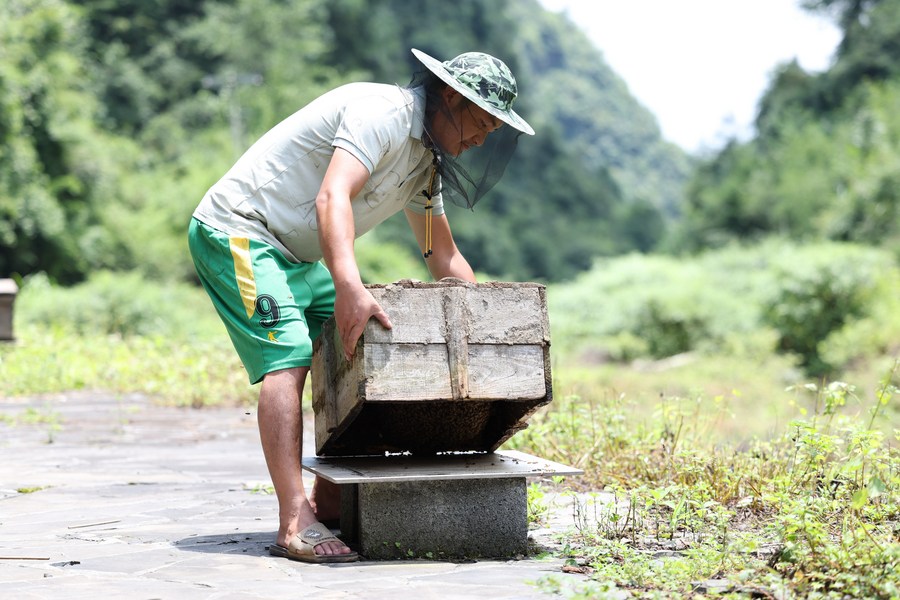
Long Xianlan, a beekeeper and head of a local cooperative, checks the condition of bees in Shibadong Village in Xiangxi Tujia and Miao Autonomous Prefecture, central China’s Hunan Province, July 2, 2022. (Xinhua/Xue Yuge)
« Long Xiulin treated me like his brother and offered me all the help and support he could, » Long Xianlan said. « I never had such strong determination to change my life through hard work. »
He earned his first pot of gold, selling 5,000 yuan worth of honey in 2016. In the same year, Shibadong was among the first batch of villages in the province that lifted all its households out of poverty.
Since then, Long’s life has been on an upward trajectory. Today, as a beekeeper and head of a local cooperative, he has registered a trademark for the honey, leading over 80 households in joining the beekeeping industry.
INDUSTRY ABOUNDS
Shibadong Village gets its name from 18 natural karst caves located nearby. Set in the highlands of the Wuling Mountains, at an altitude of about 700 meters, it overlooks a valley and green sloping terrain.
The village is picturesque, but a decade ago it lacked infrastructure, industry and investment. Many villagers left to make a living in various cities that offered more job opportunities.
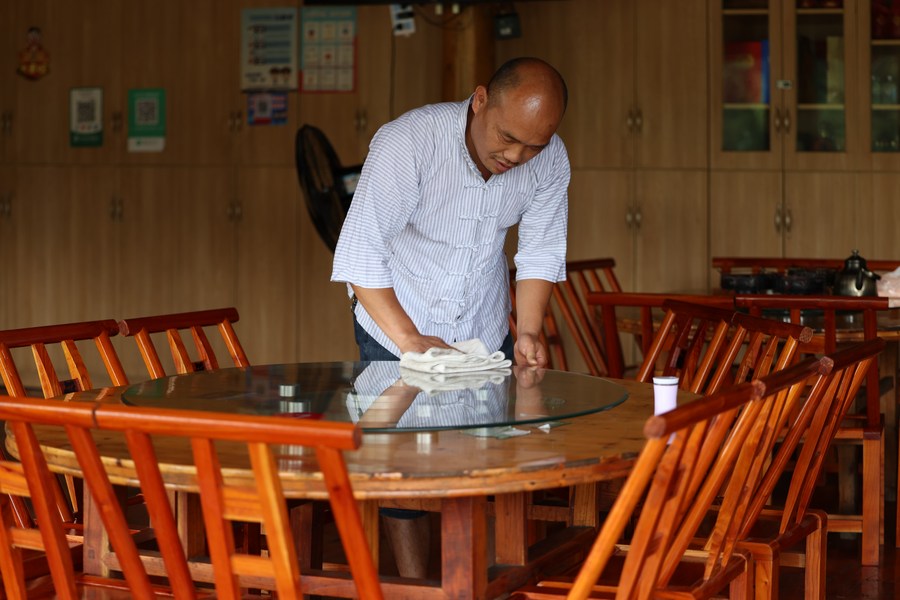
Yang Zhengbang cleans a table in his homestay in Shibadong Village in Xiangxi Tujia and Miao Autonomous Prefecture, central China’s Hunan Province, July 2, 2022. (Xinhua/Xue Yuge)
Among them is Yang Zhengbang, 44, who spent years as a migrant worker in the cities. In 2017, after learning of the tourism boom in the village, he returned home.
From 2013, Shibadong became increasingly accessible to tourists thanks to the construction of infrastructure there. With the passage of time, the village also became known for its success in poverty alleviation.
Yang was able to tap into these developments, starting a rural homestay in 2018, providing food and accommodation to visitors. This summer, Yang’s homestay receives more than 400 visitors per day on average.
« The villagers are very motivated to work and start our own businesses, and we feel that we have a promising life ahead, » Yang said.
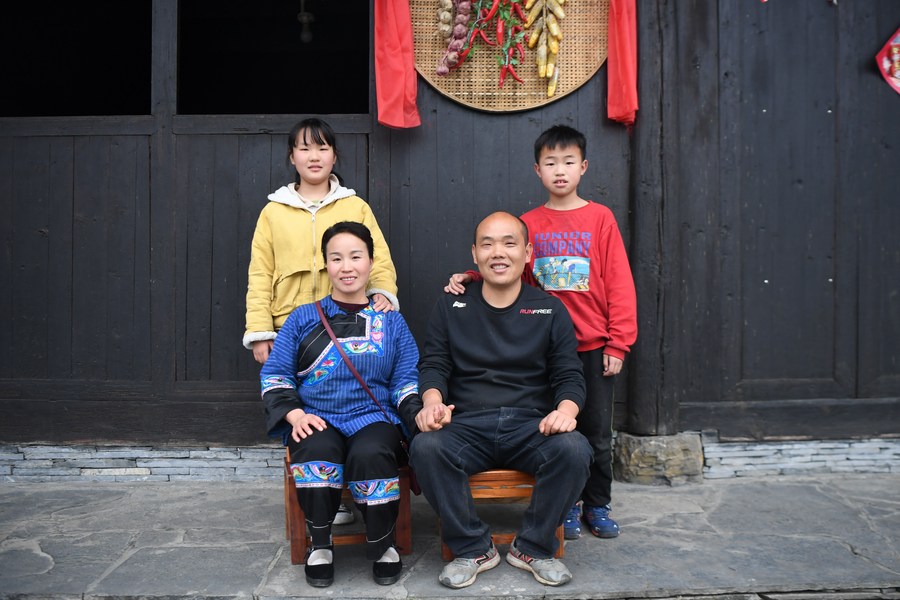
Yang Zhengbang, who runs a rural homestay, poses for a group photo with his family members in Shibadong Village in Xiangxi Tujia and Miao Autonomous Prefecture, central China’s Hunan Province, April 25, 2020. (Xinhua/Xue Yuge)
Over the years, Shibadong Village has developed several industries that draw on its strengths. Located in Xiangxi Tujia and Miao Autonomous Prefecture, the village has fostered ethnic Miao embroidery as its distinctive industry. It has also capitalized on its mountain spring water resources, forming the Shibadong Mountain Spring Water Co., Ltd. in 2017. In addition, the village has been promoting various forms of farming.
In 2013, the per-capita net annual income was 1,668 yuan, only 18.8 percent of the average income in other rural areas. In 2021, the figure surged to more than 20,000 yuan.
RURAL VITALIZATION
With the victory in poverty alleviation, China is forging ahead with rural vitalization in an all-round way. Young people are playing an important role in this process.
The success of Shibadong’s poverty-reduction efforts has attracted more youths to the village. Mei Yao, a non-local graduate from a famous Chinese university, became the director of the village’s women’s federation in 2018. She considers it a great opportunity to learn about how to guide and support rural residents in developing industries.
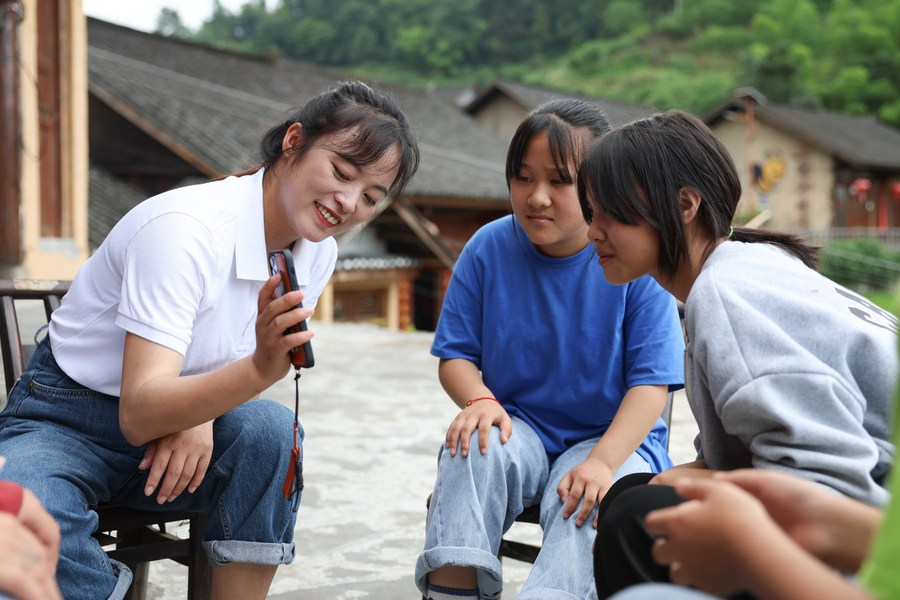
Mei Yao, director of the village’s women’s federation, talks with students who are on summer vacation in Shibadong Village in Xiangxi Tujia and Miao Autonomous Prefecture, central China’s Hunan Province, July 2, 2022. (Xinhua/Xue Yuge)
« For me, a village is like a book, and Shibadong is definitely the one most worth reading, » said Mei. « From here, I can become part of the grand scheme of China’s rural vitalization and of the promising future of the rural areas. »
Shi Kang, 22, returned to the village in 2019 after studying a media-related major in the provincial capital Changsha.
Shi grew up in the village while his parents worked in the cities. Back then, he was timid and ashamed to talk to others about his hometown due to its dire poverty. Today, the mindset has changed.
« Many of my peers are willing to come back now, and we would feel proud to say Shibadong is our village, » he said.
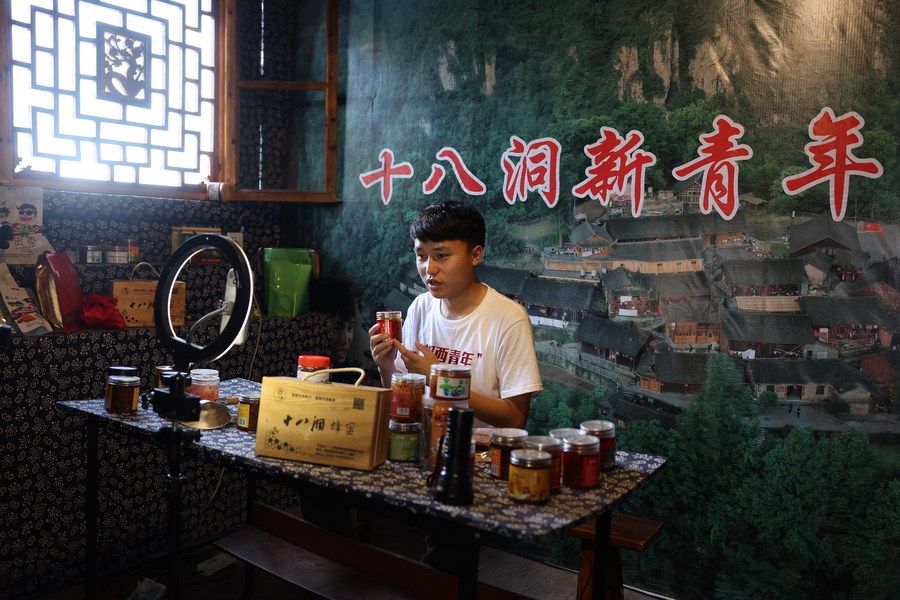
Shi Kang promotes village produce on a livestream in Shibadong Village in Xiangxi Tujia and Miao Autonomous Prefecture, central China’s Hunan Province, July 2, 2022. (Xinhua/Xue Yuge)
Taking advantage of his major, Shi shoots videos about village life, local cuisine and folk stories, and publishes them on short-video platforms.
He has also formed a team with several like-minded young people to regularly livestream online, sharing the stories of Shibadong and promoting village produce such as honey, cured pork and chili peppers.
Their account on Douyin has attracted around 20,000 followers and garnered 84,000 likes. He plans to continue to improve the brand certification of the agricultural products they sell on the platform.
« We would like to take Shibadong’s products further through the internet, » said Shi. « I am full of confidence about the future of the village. » ■
(Video reporter: Yao Yu; video editor: Hong Liang, Mu Xuyao, Wang Houyuan.)
Réagir 📢
📧[ Nous contacter ] 💌 [ Nous faire un don ] 🌐 [ Couverture médiatique ]


